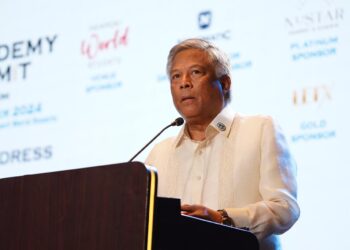Former Star Entertainment Group CEO Robbie Cooke has told an inquiry into the company’s suitability to retain its Sydney casino license that negotiations with the state’s casino license were a “one way street” and pushback was necessary to address matters of disagreement.
In lengthy testimony given to the inquiry on Wednesday at which he was at times defensive and even combative, Cooke was grilled about a response he had prepared in January to the findings of a report by the Manager appointed to oversee Star’s remediation efforts on the company’s progress.
That report, delivered by Manager Nicholas Weeks last December, had identified a number of deficiencies in that progress but was met with opposition from Cooke and Star, whose response took issue with many of Weeks’ observations. It has been suggested throughout the inquiry that the tone of the response was “confrontational”.
Cooke, who stepped down as CEO and Managing Director in late March, on Wednesday defended the nature of his response but admitted he had submitted it to the NSW Independent Casino Commission (NICC) in the knowledge “it was going to be controversial”.
“I said to my board when the decision was made to respond to the Manager’s reports that we were going down a one way street, so I did know – and this was not a position I was particularly comfortable in – that we were taking a position in relation to matters.
“I did try to write the response and the covering letter in a way which indicated we were doing it respectfully and trying to ensure that where there were matters that we didn’t agree with or that were contentious, that we did so in a clinical way rather than an emotive way.
“But it was a difficult position for the company because we were taking a contrary position to the manager and some of his views of the company.”
Asked by counsel assisting the inquiry, Caspar Conde, if he felt the response was “entirely inappropriate”, Cooke replied, “No I don’t, because there were things there that actually needed to be addressed and I’ve got to say I don’t know how else the company could have dealt with it.
“I was trying to be cooperative with the regulator and trying to do this in a respectful way and making sure communications between the board and the regulator didn’t contaminate into the wider team.”
Cooke was also asked to elaborate on his commentary around Star’s relationship with the NICC being a one-way street, to which he responded, “Well, in my experience having worked in regulated industries for most of my career, interacting with your regulator and how you do that is very important. Sometimes you do have to take a position and that is often difficult and often can cause issues, so it’s not easy to take that position and then reverse out of it.”
Cooke was also asked about a series of text messages exchanged between he and Star Chairman David Foster in early February in which the pair said they were ready to “go to war” with the NICC, allegedly due to concerns around a meeting they learned was planned between the regulator and Weeks in Star’s Sydney offices.
According to Cooke, those texts were merely a “moment in time” with the duo “on high alert” after learning of the meeting – to which they weren’t invited – only hours prior.
“We were getting ready for what might have been coming,” he said. “This is a text about something we had just been alerted to involving three law firms and our NSW license. I would say I was on high alert as a result.”
Conde was less subtle in asking Cooke about texts from Foster that discussed establishing grounds for a potential class action by shareholders against Weeks and the NICC, to which Cooke had replied at the time, “We will run that by [law firm] KWN Monday.”
Putting Cooke to the test, Conde asked, “What on earth were you doing seeking external legal advice about the possibility of shareholders suing the manager and/or the NICC?”
Cooke responded, “I’m not sure I even did run that by KWN. I can’t recall actually taking that anywhere. I don’t think it was a good idea.”
Cooke did, however, accept that discussions around suing the Manager and regulator was in stark contrast to public statements Star had made guaranteeing cooperation and transparency with the NICC.
“I would agree with that, yes,” Cooke said.
Weeks last week told the inquiry he was “surprised and disappointed” in Star’s response to his past findings.
“There was an extensive amount of commentary and rejections of findings in that report,” Weeks said in testimony given on 15 April. “I had several meetings, both with the board and with Mr Cooke in relation to the report where very few questions were asked.
“So, I was surprised when there was as many comments received back as I did. I was disappointed because the purpose of providing that report to the company was so they could be clear about those things that I considered to be deficiencies and areas that needed to be addressed and the way they are characterised in the report was potential impediments to reform.
“I was disappointed because the company’s rejection of my assessment of many of those deficiencies seemed to say that there was an enhanced or increased chance that the company was not going to take steps to address those findings and observations which I regarded to be accurate and legitimate.”


































